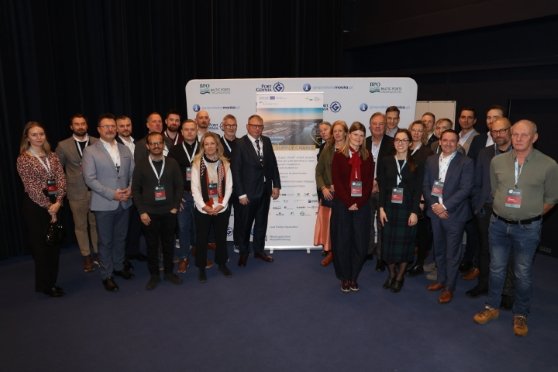
The Final Conference of the Blue Supply Chains (BSC) Project, “Decarbonising Port Operations & Supply Chains: Insights from the Blue Supply Chains Project,” is being held as part of the Baltic Ports for Climate Conference, hosted by the Port of Gdynia. The Baltic Ports Organization is one of the members of a rich and varied partner consortium. The BSC project is set to successfully conclude by the end of 2025.
This conclusive session focuses on the critical need to accelerate the
energy transition in the maritime sector, recognizing that 80% of the
EU’s trade relies on maritime transport, which still utilizes conventional fossil fuels for over 99% of its energy consumption.
Hunter Reinhardt (Interreg Baltic Sea Region Programme), will be sharing insights into the Interreg BSR Programme’s mission. Interreg BSR is committed to fostering transnational cooperation and cohesive development across the shared region. Crucially, the program is dedicated to supporting decarbonization in port operations through the promotion of electrification, alternative fuels, and eco-friendly transport networks, as exemplified by Blue Supply Chains. Energy transition remains critical, encompassing the shift from fossil fuels to renewable sources such as wind, solar, bioenergy, and hydrogen, and connecting directly to green and energy-efficient mobility like shipping.
“Maritime transport is at the heart of our region's identity and economy, and is - to my eyes - inherently transnational. By bringing together partners from across the Baltic Sea Region, initiatives like Blue Supply Chains, supported by the EU through Interreg, can drive real progress toward decarbonising shipping and strengthening sustainable supply chains,” commented Hunter before the event.
Sami Vesterinen (EU Strategy for the Baltic Sea Region, PA Ship) will highlight the urgent need for decarbonisation in the maritime sector. Maritime transport is currently responsible for approximately 3–4% of EU greenhouse gas emissions. Driven by the EU’s goal for net-zero emissions by 2050, new regulations—such as FuelEU Maritime, the ETS for shipping, and the Alternative Fuels Infrastructure Regulation (AFIR)—are guiding the transition. This effort concentrates on low-carbon fuels, energy efficiency, and clean port infrastructure, including on-shore power supply (OPS) systems. Ports are considered front runners in this decarbonization movement.
As shared by Sami, “Decarbonising maritime transport is one of the main priorities of EUSBSR PA Ship in making the maritime sector more sustainable. The transnational efforts of the Blue Supply Chains project have been invaluable in transforming
the holistic transport chain within ports across the region. The
cooperation between PA Ship and Blue Supply Chains has been excellent from the very beginning, and PA Ship looks forward to further opportunities for collaboration. Even after the project completion, PA Ship will continue to disseminate the successful results achieved by Blue Supply Chains.”
The project is structured around various complex pilot actions developed in parallel by partners from eight European countries. Panelists from the Swedish Environmental Institute (IVL), Ventspils High Technology Park, Gdynia Container Terminal (GCT), Stena Line, Klaipeda Science and Technology Park (KTSP) and the Port of Skagen, will share insights into the project’s numerous activities and pilot programmes.
These include, among others:
addressing the reduction of GHG emissions from port operations through electrification, including implementation of on-shore power supply (OPS) systems and exploring retrofitting options for RTG cranes
creating a national strategy for the production, loading, and bunkering of fossil-free fuels, and establishing Europe's first green internal waterway transport corridor on the Neman River between Klaipeda and Kaunas, combined with the development of an electric tugboat
developing road maps for providing green energy to transport chains, improved green transport chains demonstrated through stakeholder cooperation, and a manual for the electrification process of port operations
The BSC project, launched to aid port authorities and operators in the Baltic Sea Region, actively supports the decarbonisation of port operations by advancing electrification, providing strategies for alternative fuels, and establishing green transport chains. Although ports are essential strategic infrastructures, they significantly contribute to pollutant emissions through their activities. The project’s overall mission is to turn ports into valuable assets in the necessary transition toward zero-emission operations and green fuels, thereby meeting the ambitious EU climate change targets.
The BSC project is a Core Project under the Interreg Baltic Sea Region Programme (BSRP), running from January 2023 to December 2025, with a budget of 4.6 million EUR and involving over 20 partners across 8 BSR countries.
We encourage all interested stakeholders, industry professionals, and the public to visit the project website to explore the comprehensive outcomes, pilot project details, and publications generated by this vital EU-funded initiative.
The BSC project is slated to conclude in December 2025.
Photos: BSC and Port of Gdynia
Source, BPO





.jpg)




